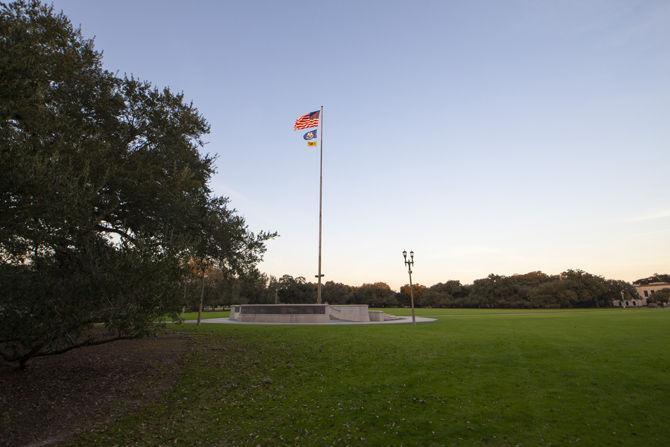Less than two weeks after LSU’s triumph in the College Football Playoff National Championship, it’s time to focus on another topic — the selection of the University’s next president.
F. King Alexander announced his intention to become the next president of Oregon State University in December, after six tumultuous years of battling the state legislature, addressing Greek Life policy overhauls and an admissions policy controversy. Entering the new decade, LSU is without a permanent leader and a clear vision for its future.
A decade of budget cuts decimated the University by delaying vital construction projects and exacerbating the loss of talented faculty. Louisiana ranks 48th in the nation for per-student spending at four-year public universities, according to a Louisiana Board of Regents report. LSU ranked No. 153 in U.S. News & World Report’s 2020 ranking of American universities. Though administrators often boast the University’s low cost of attendance, U.S. News & World Report slotted LSU No. 173 in its list of “Best Value Schools.”
The state’s higher education spending has finally stabilized after years of bloodletting. Former Gov. Bobby Jindal and the Republican-controlled legislature of the early 2010s gutted the University. State appropriations to LSU were cut by 49% during the Jindal Administration, down from $230 million to $117 million.
In many ways, the next president will take over a University bubbling with potential. He or she will inherit a financial situation much better than Alexander’s in 2013, due to Louisiana’s economic growth. Gov. John Bel Edwards pledged to increase the state’s higher education funding as he embarks on his second term this year. The University’s “Fierce for the Future” campaign rolls on, seeking to push the LSU System’s total endowment over $1.5 billion. And, of course, LSU Athletics continues its on-field excellence.
Despite LSU’s apparent momentum, the selection of the next president is a critical juncture, which could elevate the University to unprecedented heights or send it spiraling back to the nightmarish Jindal years. This decision not only affects the current crop of University students but their children and following generations who will walk the stately oak-lined campus paths.
The Board of Supervisors’ search process for the University’s next president in 2013 was shrouded in secrecy. Participants in the process were encouraged to advert Louisiana public records laws by using personal email accounts and avoid written communication about the candidates.
A 2013 lawsuit filed by former Daily Reveille Editor-in-Chief Andrea Gallo — later joined by both The Times-Picayune and The Advocate — combated this secrecy.
After Gallo’s requests for the names of candidates applying to the presidential position were denied, she sued for release of information to the public. Although a district judge ruled in favor of the Board of Supervisors, the lawsuit itself encapsulated the extreme discontent of the University community. In the Board’s current search for president, a commitment to transparency must be of the utmost importance.
Over its 160 year history, the University has had over 25 superintendents and presidents, all of whom have been white men. The Board should make an effort to consider females, people of color and other candidates that better reflect the University’s changing demographic.
One of the top priorities for the next president must be to demolish the Troy H. Middleton Library. The open wound is a decaying relic unfit for the state’s flagship institution and a shrine dedicated to the University’s painful, racist past. The Campus Master Plan calls for the replacement of Middleton, but few steps have been taken since the plan’s implementation in 2017.
Funding, as expected, is the greatest impediment preventing the demolition of Middleton. Total enrollment stands at 31,751, as of Fall 2019, after back-to-back record-breaking freshman classes, but still falls short of the Campus Master Plan’s target goal of 35,000. Due to slashed state funding, a lion’s share of the University’s revenue must come from tuition and fees. Tuition and fees for in-state and out-of-state students skyrocketed 129% and 99%, respectively, from 2009 to 2019.
Reduced state funding not only handicaps the University’s ability to demolish Middleton and address its $616-million backlog of deferred maintenance projects but makes it difficult to retain and attach talented faculty members. From 2009 to 2013, University faculty received no raises. Though raises were issued three times during Alexander’s tenure, the pay increases fail to compensate for years of stagnant salaries.
Candidates should also address parking and housing concerns. With larger incoming classes and overflowing residential housing, something must be done by the next administration to comfortably accommodate all students. This fall, Res Life was in “overflow” mode, temporarily housing students in the retired Kirby Smith Hall. Parking is also a pressing situation on campus, with declining availability of parking near the central campus and a steady flow of tickets issued to students.
As the spring progresses, a handful of names will be circulated as Alexander’s replacement. The successor must provide an alternative to the status quo, not a continuation of the University’s current trajectory.











